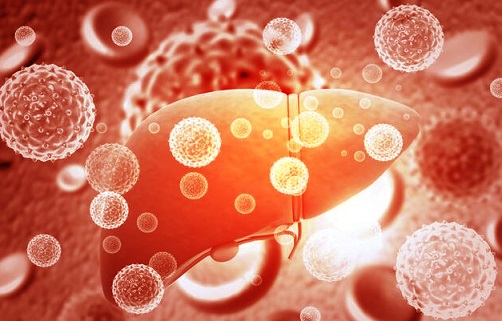Nikhil Prasad Fact checked by:Thailand Medical News Team Dec 19, 2024 3 months, 3 weeks, 5 days, 5 hours, 39 minutes ago
Medical News: COVID-19 has had a significant global impact since its outbreak in 2019, with millions of people affected. However, its interaction with other diseases like chronic hepatitis B virus (HBV) infection has raised concerns among researchers. A team from Peking University Third Hospital in Beijing, China, and the University of Pittsburgh, USA, conducted a detailed study to understand how COVID-19 influences chronic HBV patients.
 Study Reveals Hepatitis B Patients Face Higher Risk of Long COVID Symptoms
Study Reveals Hepatitis B Patients Face Higher Risk of Long COVID Symptoms
Chronic hepatitis B is a long-standing liver condition that affects millions globally, particularly in China, where one-third of the world’s HBV population resides. This
Medical News report aims to break down the study’s findings and explain its implications in simple terms.
Key Focus of the Study
The research team analyzed whether COVID-19 worsens hepatitis B infections and whether HBV patients face higher risks of developing long COVID symptoms. The study involved 940 patients, split into two groups:
-189 HBV patients (divided into those receiving antiviral therapy and those not)
-751 non-HBV patients
The researchers examined COVID-19 symptoms, long COVID complaints, and laboratory results, including liver and kidney function, before and after the patients contracted COVID-19.
COVID-19 Impact on Hepatitis B
The study found that HBV patients did not experience a significant increase in their HBV viral load after COVID-19 infection. For HBV patients receiving antiviral treatment, such as Tenofovir or Entecavir, the viral load remained stable, showing that COVID-19 did not worsen their hepatitis B condition. Even among untreated HBV patients, no evidence pointed to severe HBV reactivation.
Researchers specifically monitored key liver health indicators like ALT (liver enzyme) and bilirubin levels. While there were slight changes in alkaline phosphatase (ALP) and kidney function indicators, such as creatinine levels, these remained within normal ranges. Thus, this study reassures HBV patients that COVID-19 does not appear to directly worsen their liver condition.
Long COVID Symptoms in Hepatitis B Patients
One of the most significant findings was the higher prevalence of long COVID symptoms among HBV patients compared to non-HBV patients. Long COVID refers to lingering health problems that persist for weeks or months after recovering from the initial infection.
Out of the HBV group:
64.1% reported long COVID symptoms, compared to 48.7% of non-HBV patients.
The most common long COVID symptoms among HBV patients were:
-Cough
-Fatigue
-Palpitations (a feeling of rapid or irregular heartbeat)
-Insomnia
-Memory impairment
These findings suggest that HBV patients, even though they may experi
ence fewer acute COVID-19 symptoms like sore throat or nasal congestion, are more prone to lingering issues post-infection.
Role of Antiviral Treatment
The study further divided HBV patients into two groups based on whether they were receiving antiviral therapy. Interestingly, patients on antiviral treatment reported fewer symptoms during COVID-19 and fewer long COVID complaints.
For example:
-Sore throat incidence was significantly lower (29.1%) in the antiviral group compared to those without treatment (46.9%).
-Long COVID symptoms like dry cough were also reduced in the antiviral group (24.4% vs. 42.4%).
These findings highlight the potential benefits of antiviral treatment in mitigating both COVID-19 severity and lingering symptoms. Researchers noted that antiviral medications like Tenofovir may even play a role in reducing COVID-19 replication, though further research is needed.
Why Are HBV Patients More Prone to Long COVID?
The reasons behind higher long COVID rates in HBV patients remain unclear, but scientists have proposed a few possible explanations:
-Weakened immune system: Chronic hepatitis B can suppress the immune system, making it harder to recover fully from infections like COVID-19.
-Mental health factors: Patients with chronic diseases like hepatitis B are more likely to report mental health issues, such as fatigue, depression, and sleep disturbances. These conditions could amplify their perception of long COVID symptoms.
-Underlying liver problems: Many HBV patients are also prone to conditions like fatty liver disease, which may complicate recovery from COVID-19.
Conclusions
The study provides some important insights into the intersection of COVID-19 and hepatitis B. While COVID-19 does not appear to worsen hepatitis B infections directly or cause significant liver damage, HBV patients are at a higher risk of experiencing long COVID symptoms.
HBV patients should monitor their health carefully after recovering from COVID-19, especially if they experience persistent symptoms like fatigue, cough, or memory problems. Doctors and healthcare providers need to pay closer attention to these patients, ensuring they receive timely support and treatment.
The findings also emphasize the benefits of antiviral therapy, which not only helps manage hepatitis B but may also reduce COVID-19 complications. More research is needed to fully understand the connection between antiviral medications and COVID-19 outcomes.
In summary, while HBV patients can take comfort in knowing their liver health remains stable post-COVID, they should be aware of the risks of long COVID and seek medical advice if lingering symptoms persist.
The study findings were published in the peer reviewed journal: BMC Infectious Diseases.
https://link.springer.com/article/10.1186/s12879-024-10333-z
For the latest COVID-19 News, keep on logging to Thailand
Medical News.
Read Also:
https://www.thailandmedical.news/news/derivative-of-the-phytochemical-rupestonic-acid-shows-promise-in-hepatitis-b-treatment
https://www.thailandmedical.news/news/breaking-covid-19-news-scientists-from-university-of-texas-warn-that-sars-cov-2-can-also-cause-seronegative-autoimmune-hepatitis-in-adults
https://www.thailandmedical.news/articles/coronavirus
